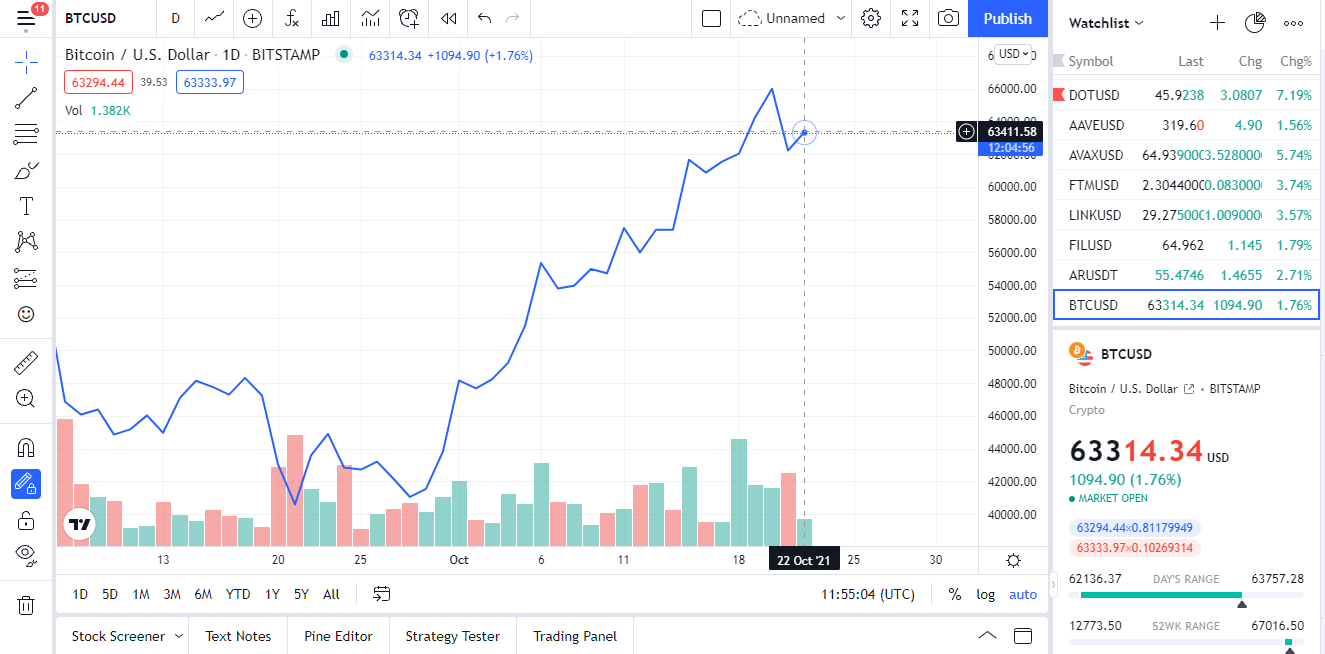The ProShares futures-based bitcoin ETF made its market debut on the New York Stock Exchange under the ticker "BITO''. This comes after months of applications to the Securities and Exchange Commission (SEC) by multiple ETF providers. The anticipation of the IPO propelled the price of Bitcoin to new highs. And institutional investors have returned to BTC, seeing the possibility for increased demand. As a result, Bitcoin has hit its new ATH after months, taking the price to over $66000 this week.
[caption align="alignnone"] BTC Chart[/caption]
BTC Chart[/caption]
Following this announcement, not only Bitcoin but also the entire crypto market is again gaining momentum. However, some crypto experts have other things to say about this. They are still skeptical and not sure about the SEC’s decision to approve a futures-based Bitcoin ETF. Tyrone Ross, CEO of Onramp Invest, says:
“This is not something for retail investors to buy, in my opinion. There’s plenty of outlets to buy bitcoin directly. Buying a futures ETF, where the average retail investor does not understand ETFs or futures, which are complicated, is not the best product for retail investors.”
Note that Onramp Invest provides crypto asset management technology for financial advisors, tells CNBC Make It. This article will help you to understand everything you need to know before you decide to buy BTC ETF Futures.
Understand What You Are Buying
The one and probably the most important thing that you need to understand here is that you are not buying Bitcoin. A bitcoin futures ETF tracks contracts that speculate on the digital asset's future price rather than the cryptocurrency's current or "spot" price. As a result, the ETF's and Bitcoin prices will diverge. This means that the price of a bitcoin ETF based on futures could trade at a premium in a bull market or a disadvantage in a bear market.
Futures market events, such as when the manager must roll out of an expired contract and into the current contract, will have an impact on this fund's capacity to monitor bitcoin's actual price and could raise trading costs. Ross says, “...the futures market is very obtuse for the average investor. But, overall, I think the main thing to understand is, you’re not buying bitcoin.”
Though Ross believes that the creation of a futures-based bitcoin ETF is beneficial to the larger bitcoin and crypto markets, he cautions that it may not assist individual retail investors.
“An ETF is going to drive more of that institutional money in, but they’re going to make a ton of money. It does help the liquidity of the market, but what about the retail investor? We’re supposed to help those folks, [and that’s] not necessarily what is happening here,” Ross stated.
Other financial professionals, as well as some members of the cryptocurrency community, concur with Ross. Some claim that hedge funds and providers involved in a possible ETF investment would benefit more than regular investors, especially if the ETF trades at a premium during bull markets.
A futures-based bitcoin ETF could be useful for people who aren't sure how to buy bitcoin safely or who don't want to be responsible for protecting and securing their bitcoin wallet. Bitcoin's price fluctuates a lot, so an investor buying the cryptocurrency directly would have to be ready to deal with it.
Difference Between BTC ETF & BTC Futures-Based ETF
The distinctions between a Bitcoin ETF and a Bitcoin futures ETF aren't just theoretical. The Commodity Futures Trading Commission, not the Securities and Exchange Commission, regulates the futures market. Spot markets, on the other hand, are more susceptible to manipulation, according to Gensler and the SEC.
Furthermore, while both trade like stocks and track the price of a basket of assets, the price of Bitcoin would be tightly related to a regular ETF. BTC might be included in the portfolios of everyday investors, including those saving for retirement, in the same way, that Apple or Tesla shares might be.
A Bitcoin futures ETF, on the other hand, is linked to Bitcoin futures contracts, which are speculative wagers on the cryptocurrency's future price that allow investors to lock in a price in advance. Unlike a pure ETF, which would give investors exposure to the current price of Bitcoin, the present lineup of futures ETFs exposes investors to market sentiment.
The bullish mood is at an all-time high right now. It would most likely rise if it were held in a regular ETF. Regrettably, that is not on the agenda for investors.
SEC Is Yet To Make A Decision on BTC ETF
Meanwhile, an original bitcoin ETF is awaiting to hit the US Stock Exchange. Many investors had hoped for a "pure" Bitcoin ETF this year—one that wasn't dependent on BTC futures—for the time being, it appears like more Bitcoin futures ETFs will be launched to compete with ProShares.
The SEC in the US has a backlog of applications that do not require approval. They can silently come into existence if the agency does not object. (However, if the SEC formally approves them, they could take effect sooner).
 cryptoknowmics.com
cryptoknowmics.com